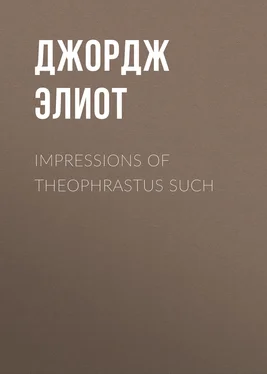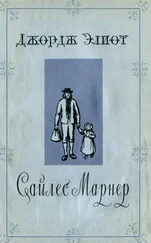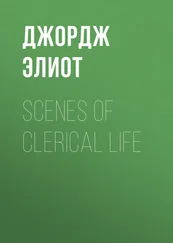Джордж Элиот - Impressions of Theophrastus Such
Здесь есть возможность читать онлайн «Джордж Элиот - Impressions of Theophrastus Such» — ознакомительный отрывок электронной книги совершенно бесплатно, а после прочтения отрывка купить полную версию. В некоторых случаях можно слушать аудио, скачать через торрент в формате fb2 и присутствует краткое содержание. Жанр: Биографии и Мемуары, literature_19, foreign_antique, на английском языке. Описание произведения, (предисловие) а так же отзывы посетителей доступны на портале библиотеки ЛибКат.
- Название:Impressions of Theophrastus Such
- Автор:
- Жанр:
- Год:неизвестен
- ISBN:нет данных
- Рейтинг книги:4 / 5. Голосов: 1
-
Избранное:Добавить в избранное
- Отзывы:
-
Ваша оценка:
- 80
- 1
- 2
- 3
- 4
- 5
Impressions of Theophrastus Such: краткое содержание, описание и аннотация
Предлагаем к чтению аннотацию, описание, краткое содержание или предисловие (зависит от того, что написал сам автор книги «Impressions of Theophrastus Such»). Если вы не нашли необходимую информацию о книге — напишите в комментариях, мы постараемся отыскать её.
Impressions of Theophrastus Such — читать онлайн ознакомительный отрывок
Ниже представлен текст книги, разбитый по страницам. Система сохранения места последней прочитанной страницы, позволяет с удобством читать онлайн бесплатно книгу «Impressions of Theophrastus Such», без необходимости каждый раз заново искать на чём Вы остановились. Поставьте закладку, и сможете в любой момент перейти на страницу, на которой закончили чтение.
Интервал:
Закладка:
Something came of this alteration in my point of view, though I admit that the result is of no striking kind. It is unnecessary for me to utter modest denials, since none have assured me that I have a vast intellectual scope, or—what is more surprising, considering I have done so little—that I might, if I chose, surpass any distinguished man whom they wish to depreciate. I have not attained any lofty peak of magnanimity, nor would I trust beforehand in my capability of meeting a severe demand for moral heroism. But that I have at least succeeded in establishing a habit of mind which keeps watch against my self-partiality and promotes a fair consideration of what touches the feelings or the fortunes of my neighbours, seems to be proved by the ready confidence with which men and women appeal to my interest in their experience. It is gratifying to one who would above all things avoid the insanity of fancying himself a more momentous or touching object than he really is, to find that nobody expects from him the least sign of such mental aberration, and that he is evidently held capable of listening to all kinds of personal outpouring without the least disposition to become communicative in the same way. This confirmation of the hope that my bearing is not that of the self-flattering lunatic is given me in ample measure. My acquaintances tell me unreservedly of their triumphs and their piques; explain their purposes at length, and reassure me with cheerfulness as to their chances of success; insist on their theories and accept me as a dummy with whom they rehearse their side of future discussions; unwind their coiled-up griefs in relation to their husbands, or recite to me examples of feminine incomprehensibleness as typified in their wives; mention frequently the fair applause which their merits have wrung from some persons, and the attacks to which certain oblique motives have stimulated others. At the time when I was less free from superstition about my own power of charming, I occasionally, in the glow of sympathy which embraced me and my confiding friend on the subject of his satisfaction or resentment, was urged to hint at a corresponding experience in my own case; but the signs of a rapidly lowering pulse and spreading nervous depression in my previously vivacious interlocutor, warned me that I was acting on that dangerous misreading, "Do as you are done by." Recalling the true version of the golden rule, I could not wish that others should lower my spirits as I was lowering my friend's. After several times obtaining the same result from a like experiment in which all the circumstances were varied except my own personality, I took it as an established inference that these fitful signs of a lingering belief in my own importance were generally felt to be abnormal, and were something short of that sanity which I aimed to secure. Clearness on this point is not without its gratifications, as I have said. While my desire to explain myself in private ears has been quelled, the habit of getting interested in the experience of others has been continually gathering strength, and I am really at the point of finding that this world would be worth living in without any lot of one's own. Is it not possible for me to enjoy the scenery of the earth without saying to myself, I have a cabbage-garden in it? But this sounds like the lunacy of fancying oneself everybody else and being unable to play one's own part decently—another form of the disloyal attempt to be independent of the common lot, and to live without a sharing of pain.
Perhaps I have made self-betrayals enough already to show that I have not arrived at that non-human independence. My conversational reticences about myself turn into garrulousness on paper—as the sea-lion plunges and swims the more energetically because his limbs are of a sort to make him shambling on land. The act of writing, in spite of past experience, brings with it the vague, delightful illusion of an audience nearer to my idiom than the Cherokees, and more numerous than the visionary One for whom many authors have declared themselves willing to go through the pleasing punishment of publication. My illusion is of a more liberal kind, and I imagine a far-off, hazy, multitudinous assemblage, as in a picture of Paradise, making an approving chorus to the sentences and paragraphs of which I myself particularly enjoy the writing. The haze is a necessary condition. If any physiognomy becomes distinct in the foreground, it is fatal. The countenance is sure to be one bent on discountenancing my innocent intentions: it is pale-eyed, incapable of being amused when I am amused or indignant at what makes me indignant; it stares at my presumption, pities my ignorance, or is manifestly preparing to expose the various instances in which I unconsciously disgrace myself. I shudder at this too corporeal auditor, and turn towards another point of the compass where the haze is unbroken. Why should I not indulge this remaining illusion, since I do not take my approving choral paradise as a warrant for setting the press to work again and making some thousand sheets of superior paper unsaleable? I leave my manuscripts to a judgment outside my imagination, but I will not ask to hear it, or request my friend to pronounce, before I have been buried decently, what he really thinks of my parts, and to state candidly whether my papers would be most usefully applied in lighting the cheerful domestic fire. It is too probable that he will be exasperated at the trouble I have given him of reading them; but the consequent clearness and vivacity with which he could demonstrate to me that the fault of my manuscripts, as of my one published work, is simply flatness, and not that surpassing subtilty which is the preferable ground of popular neglect—this verdict, however instructively expressed, is a portion of earthly discipline of which I will not beseech my friend to be the instrument. Other persons, I am aware, have not the same cowardly shrinking from a candid opinion of their performances, and are even importunately eager for it; but I have convinced myself in numerous cases that such exposers of their own back to the smiter were of too hopeful a disposition to believe in the scourge, and really trusted in a pleasant anointing, an outpouring of balm without any previous wounds. I am of a less trusting disposition, and will only ask my friend to use his judgment in insuring me against posthumous mistake.
Thus I make myself a charter to write, and keep the pleasing, inspiring illusion of being listened to, though I may sometimes write about myself. What I have already said on this too familiar theme has been meant only as a preface, to show that in noting the weaknesses of my acquaintances I am conscious of my fellowship with them. That a gratified sense of superiority is at the root of barbarous laughter may be at least half the truth. But there is a loving laughter in which the only recognised superiority is that of the ideal self, the God within, holding the mirror and the scourge for our own pettiness as well as our neighbours'.
II.
LOOKING BACKWARD
Most of us who have had decent parents would shrink from wishing that our father and mother had been somebody else whom we never knew; yet it is held no impiety, rather, a graceful mark of instruction, for a man to wail that he was not the son of another age and another nation, of which also he knows nothing except through the easy process of an imperfect imagination and a flattering fancy.
But the period thus looked back on with a purely admiring regret, as perfect enough to suit a superior mind, is always a long way off; the desirable contemporaries are hardly nearer than Leonardo da Vinci, most likely they are the fellow-citizens of Pericles, or, best of all, of the Aeolic lyrists whose sparse remains suggest a comfortable contrast with our redundance. No impassioned personage wishes he had been born in the age of Pitt, that his ardent youth might have eaten the dearest bread, dressed itself with the longest coat-tails and the shortest waist, or heard the loudest grumbling at the heaviest war-taxes; and it would be really something original in polished verse if one of our young writers declared he would gladly be turned eighty-five that he might have known the joy and pride of being an Englishman when there were fewer reforms and plenty of highwaymen, fewer discoveries and more faces pitted with the small-pox, when laws were made to keep up the price of corn, and the troublesome Irish were more miserable. Three-quarters of a century ago is not a distance that lends much enchantment to the view. We are familiar with the average men of that period, and are still consciously encumbered with its bad contrivances and mistaken acts. The lords and gentlemen painted by young Lawrence talked and wrote their nonsense in a tongue we thoroughly understand; hence their times are not much flattered, not much glorified by the yearnings of that modern sect of Flagellants who make a ritual of lashing—not themselves but—all their neighbours. To me, however, that paternal time, the time of my father's youth, never seemed prosaic, for it came to my imagination first through his memories, which made a wondrous perspective to my little daily world of discovery. And for my part I can call no age absolutely unpoetic: how should it be so, since there are always children to whom the acorns and the swallow's eggs are a wonder, always those human passions and fatalities through which Garrick as Hamlet in bob-wig and knee-breeches moved his audience more than some have since done in velvet tunic and plume? But every age since the golden may be made more or less prosaic by minds that attend only to its vulgar and sordid elements, of which there was always an abundance even in Greece and Italy, the favourite realms of the retrospective optimists. To be quite fair towards the ages, a little ugliness as well as beauty must be allowed to each of them, a little implicit poetry even to those which echoed loudest with servile, pompous, and trivial prose.
Читать дальшеИнтервал:
Закладка:
Похожие книги на «Impressions of Theophrastus Such»
Представляем Вашему вниманию похожие книги на «Impressions of Theophrastus Such» списком для выбора. Мы отобрали схожую по названию и смыслу литературу в надежде предоставить читателям больше вариантов отыскать новые, интересные, ещё непрочитанные произведения.
Обсуждение, отзывы о книге «Impressions of Theophrastus Such» и просто собственные мнения читателей. Оставьте ваши комментарии, напишите, что Вы думаете о произведении, его смысле или главных героях. Укажите что конкретно понравилось, а что нет, и почему Вы так считаете.











